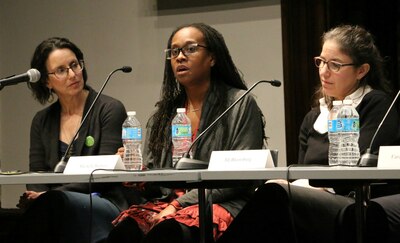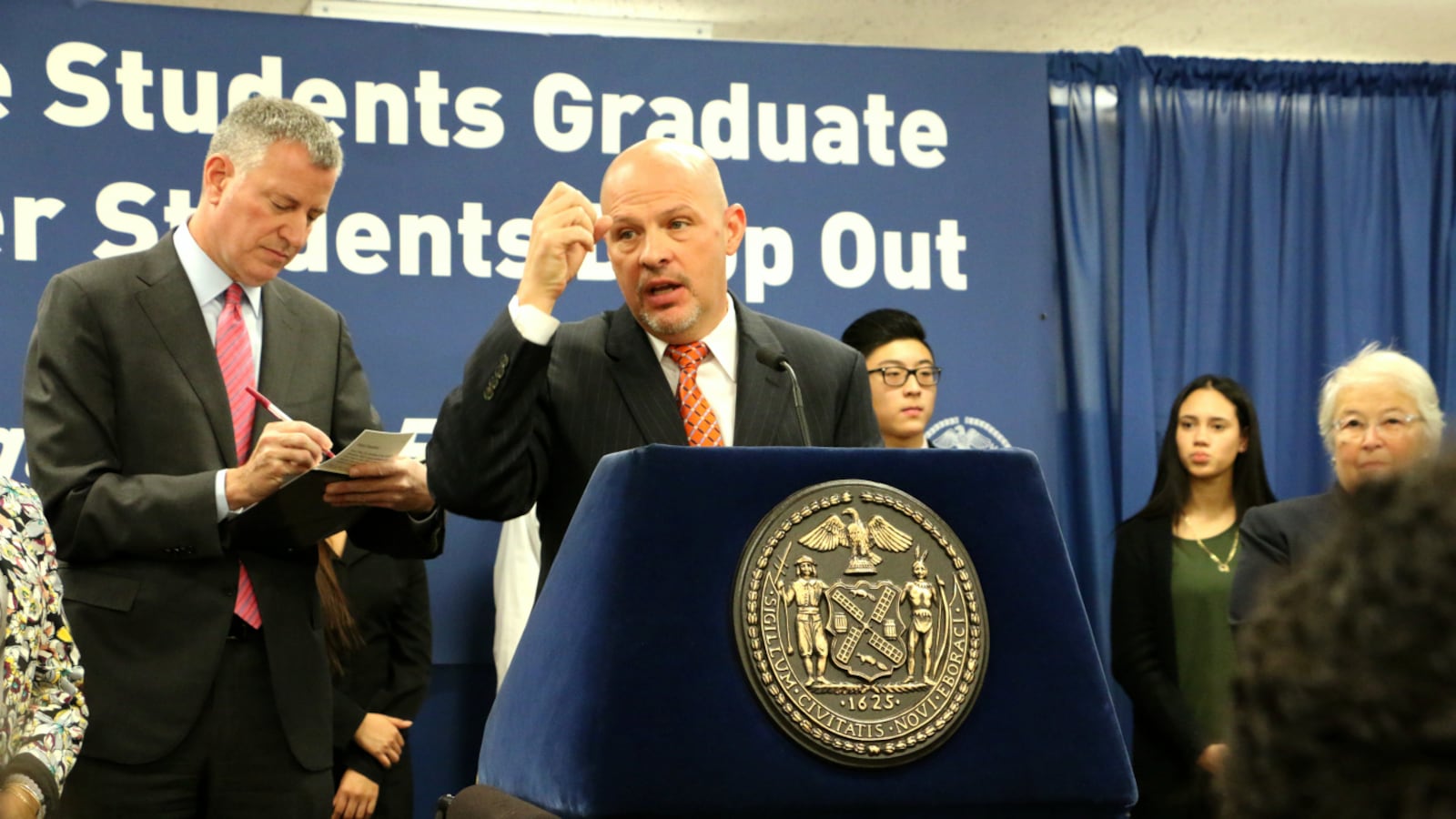Disappointment drove second-grade teacher Michelle Baptiste to run for a seat in this month’s union elections.
She watched with dismay as the city’s United Federation of Teachers — the largest local union chapter in the nation — declined to back the swelling protest movement against standardized tests, or to forcefully push for school desegregation, she said. And she has waited in vain for smaller class sizes and better training, despite a new era of cooperation between the union and City Hall.
“As a working teacher, I don’t see a whole heck of a lot of change,” said Baptiste, a member of an opposition party within the union called MORE, who is running for a seat on the union’s policy-making board. “It hasn’t trickled down to me.”
As UFT President Michael Mulgrew seeks another three-year term, he can point to the union’s rising fortunes since its last election in 2013. During that time, the union has added thousands of new members and it replaced a long-expired contract with a new one that gave teachers a hefty (if incremental) raise. In the process, Mulgrew has transformed from City Hall’s chief antagonist under former Mayor Michael Bloomberg to one of its most stalwart allies under current Mayor Bill de Blasio.
Despite those changes, a small but spirited dissident group within the union is arguing that conditions have barely improved for ordinary teachers. While those activists have little hope of ousting the union’s leadership — Mulgrew won 86 percent of the vote in 2013 — they are using the election as a chance to question how much rank-and-file members have really benefitted from the union’s new partnership with City Hall, and to force a new set of priorities onto the union’s agenda.

Leading that charge is MORE, or the Movement of Rank and File Educators, a relatively new party within the union focused on bread-and-butter labor concerns like pay and job protections, alongside hot-button policy issues like teacher evaluations and school segregation. This year it teamed up with New Action, a longstanding opposition caucus that endorsed Mulgrew in the previous election, to put forward a slate of candidates to vie for dozens of union positions, including president. (Ballots were sent out last week and must be returned by May 25.)
MORE is set to release a report Tuesday that makes the case that Mulgrew and de Blasio have failed to halt a steady deterioration of school conditions.
The report, titled “The Crisis in Our Schools,” is based on an online survey of 438 UFT members that MORE distributed last fall through social media, email groups, college professors, and other means. The respondents work in at least 200 schools across the city, according to MORE.
Nearly half of respondents said their school buildings are not in good shape, more than two-thirds said their schools do not devote adequate resources to students with disabilities, and almost a third said they are unable to make photocopies at school, the report says.
“Conditions continue to get worse,” Erik Forman, a MORE member who teaches in a Bronx high school, said in an email. Meanwhile, union leaders “fail to engage the membership in a campaign to fix the problems. Instead, they say, ‘Celebrate our schools.’’’
The union did not respond to the survey findings, but Mulgrew said in a statement that the union routinely polls its members about work conditions, then adjusts its priorities accordingly.
Another minority caucus called Solidarity, which is even newer than MORE and less well-known, is also jumping into the election. Led by Francesco Portelos, a Staten Island teacher who has clashed bitterly and publicly with his principal, the party is focused largely on teacher-administrator relations.
The minority-party candidates face tough odds partly due to the union’s unusual election rules, which allow retirees to vote. Nearly a third of the 189,469 ballots this year went to retirees, who historically have been more likely than active members to return their ballots and to back the current union leadership. In 2013, 93 percent of retirees voted for Mulgrew, while one in five active members backed the MORE candidate challenging him.
Jia Lee, this year’s MORE/New Action candidate for union president, said she knew it would be “long shot” for her to unseat Mulgrew. But the election still provides an opportunity to recruit new members, highlight issues, and encourage teachers to take more ownership of their union, she said.
“I think it’s just about raising awareness and getting members actively engaged in the union, versus just saying, ‘I have no choice,’ and shrugging your shoulders,” said Lee, a special education teacher in Manhattan who has championed the right of parents to refuse to let their children take standardized tests.
While MORE/New Action’s candidates are unlikely to replace any of the union’s dozen officers, they have a better chance of snagging one of the 90 seats on the union’s executive board, which helps set policy. In particular, they have set their sights on the seven slots reserved for high school representatives, since high school teachers have historically been more likely to support alternative candidates.
The UFT press office did not make Mulgrew available for an interview. But it pointed to campaign materials produced by his party, called Unity, that cite a host of accomplishments under his leadership. Those include an 18 percent raise for members (spread out over seven years) in the new contract, the addition of 7,000 new UFT members during Mulgrew’s tenure, and a successful bid to get policymakers in Albany to temporarily remove state test scores from teacher evaluations.
Perhaps the strongest endorsement of Mulgrew’s leadership has come from de Blasio, who has enjoyed the UFT’s steady backing even as he butted heads with the police officers’ union and his fellow Democrat, Gov. Andrew Cuomo. Speaking at the UFT’s spring conference Saturday, de Blasio praised Mulgrew as a fighter.
“In fact, when he sees a righteous cause, he goes out of his way to stand by it,” the mayor said, according to a transcript. “And that is a leadership that is helping to make this city and, in fact, this whole state a better place.”
Clarification [May 11, 2016]: This story has been updated to include additional information about the survey that MORE conducted in fall 2015.

